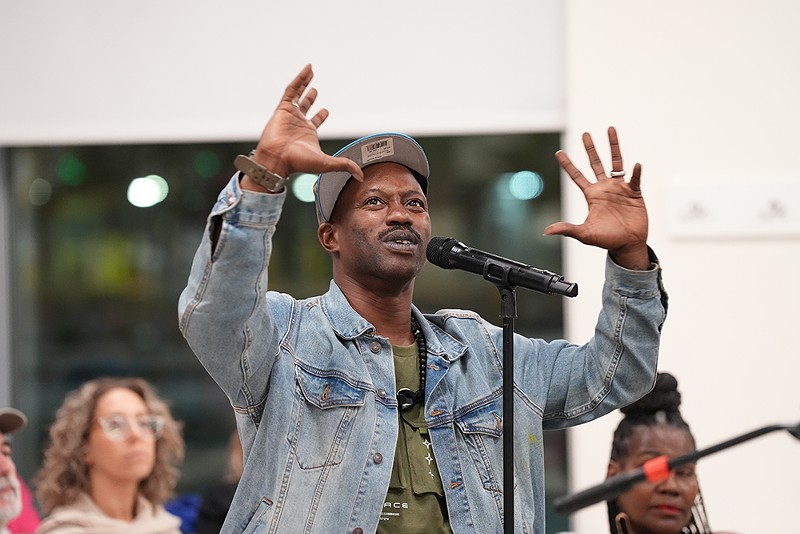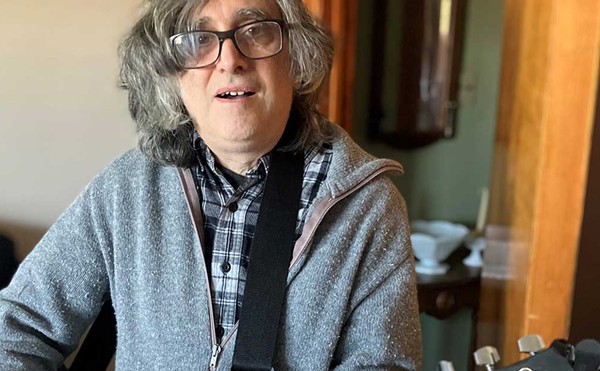Since 2009, the University of Michigan’s Semester in Detroit program has been a vehicle to build healthy relationships between its students and the city of Detroit, where they live, learn, take internships, or simply communicate with community leaders and organizations. Part of the programing of this term’s program is a four-part series of presentations to highlight and bring historical context to Detroit’s place in hip-hop culture, called “Desti-Nations of Hip-Hop.”
“It’s about the students engaging in meaningful and respectful ways with the city,” says Stephen Ward, the faculty director for the program.
Ward reached out to Khary Frazier and Sterling Toles to organize and facilitate the series. Both have been Detroit hip-hop curators and mainstays for more than two decades. Tooles is a notable producer, visual artist, and educator, while Frazier is a promoter, producer, and marketing consultant.
“They are both artists that have a deep understanding and appreciation of hip-hop, Black culture, and Detroit. They work well together,” says Ward.
“It’s so much more in hip-hop than just being on stage rapping. We wanted to show some of that because I take a hip-hop approach to all this shit and it’s the confidence I get from that, that pours into everything,” Frazier says.
Hip-hop 50th anniversary celebrations and panel discussions have been going on in cities all across the country in 2023. Some of the dialogue has been plagued by artists looking for praise from yesteryear’s accomplishments and conversations that are only about favorite songs and albums.
“We wanted to have some different discussions that haven’t been happening [...] It still is very much a subculture, a counter culture,” says Frazier.
“It wasn’t just to focus on Detroit, but a way to challenge and think differently about this 50th anniversary,” adds Ward.
Frazier and Toles made it a point to bring attention to Detroit’s historical place in hip-hop, the impact of Detroit hip-hop in and outside the music, and the urban diversity that brought artists from different Detroit neighborhoods together on the same stage many nights.
“These were conversations we were already kind of having, so just the trust and doing things within our friendship. It was just building a flow, building a format, and executing,” says Frazier.
DJ Los, Supa Emcee, Nick Speed, Boog Brown, Piper Carter, and Merciless Ameer joined Toles and Frazier at the Oct. 4 launch session that addressed the early beginnings of Detroit hip-hop. The discussion focused on significant milestones and untold stories from that time period. The first wave of Detroit hip-hop missed out on a lot of the national notoriety that the generations that came after it received, but their contributions and groundwork they laid was essential as they were the first class of artists that attempted to fill the void after Motown Records left town.
“I think that the first wave of Detroit hip-hop inhabited a unique space. And because of that unique space I don’t think the rest of the hip-hop community outside of Detroit was ready for it because it was the vortex of things that we appreciate in the city that,” says Tooles
The second session on Oct. 18 the duo will discuss the cultural proliferation of hip-hop.
“Hip-hop can be a launch pad for a lot of other things. It’s a hip-hop approach you take so we just wanted to tie things together, especially early Detroit hip-hop,” says Frazier. He goes on to highlight Detroit’s notable hip-hop alumni Khary Turner, who now runs the Coleman A. Young foundation; Jason Wilson of the of the group Kaos and Mystro, who founded the Cave of Adullam Transformational Training Academy; and Kalimah Johnson, who was one of Detroit’s first woman emcees.
“Kalimah is Detroit’s Roxanne Shante, she’s done all this stuff with the SASHA Center, and against Domestic Violence, and rape culture. It’s a hip-hop approach,” he says.
“You think about the Mula film guys, Forty da Great, Murda Pain, you know they were rappers, and now they’re making films. They’re proof in a lot of ways you can pursue hip-hop as a career, but in that pursuit it turns into a higher education for a whole other profession,” Tooles adds.
The Oct. 25 presentation, titled “I’m the Rapper She’s DJ,” is a panel discussion featuring Nique Love Rhodes and Piper Carter. There will be a live performance and dialogues centered around women’s role in hip-hop, activism, and culture.
“I remember Sydney James telling me once, ‘Being an artist as a Black woman, you’re an activist by default.’ And I think that’s Nique Love Rhodes’s role, that’s Piper’s role, and I think a lot of the women here understand that component of mobilizing people which is very much part of what they do,” says Toles.
“Nique is not in the boys club lane of hip-hop so that drives the discussion differently… she’s curating and creating stages in a different space and place,” Frazier adds.
The last presentation, “I Used to Love HER: Quantum History of Hip-Hop,” will be held on Nov. 8th. The discussion will cover everything from Detroit’s diverse hip-hop scenes and Detroit’s influences on the hip-hop culture in other cities.
“You think about the first time ever seeing the mafioso thing in hip-hop was Awesome Dre talking like Al Pacino on the intro and kind of posturing like mafia guys. I think we became an incubator for a lot of things that became permanent in the culture,” Toles says.
All events are available to the general public to attend.
“We hope you’re coming with an open mind, ready to experience something different. We’re not about to have a discussion who your top five emcees are. This is about how the culture and the music had other impacts on the lives of those involved and the lives of those that lived it,” says Frazier.
“I hope it deepens their understanding of Detroit hip-hop and their capacity for engaging with it. And it deepens the awareness of the people they’re going to interact with and learn about and learn from,” says Ward.
More information on Desti-Nations of Hip-Hop is available at bit.ly/3RMYZgn.
Subscribe to Metro Times newsletters.
Follow us: Google News | NewsBreak | Reddit | Instagram | Facebook | Twitter







